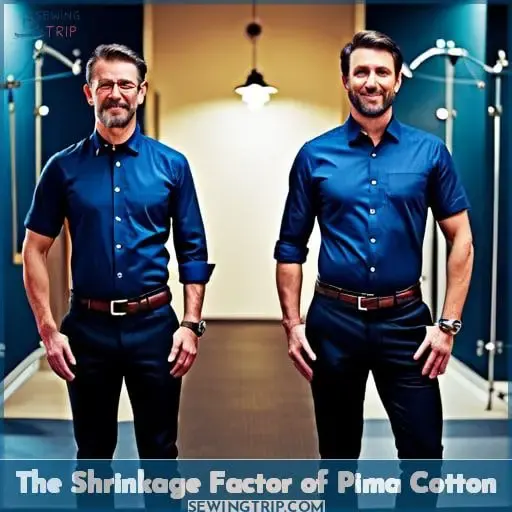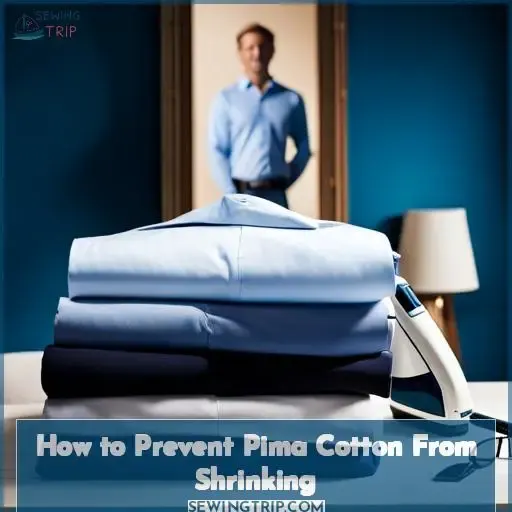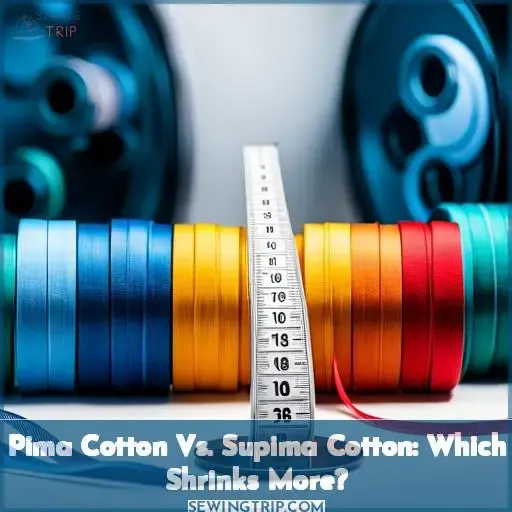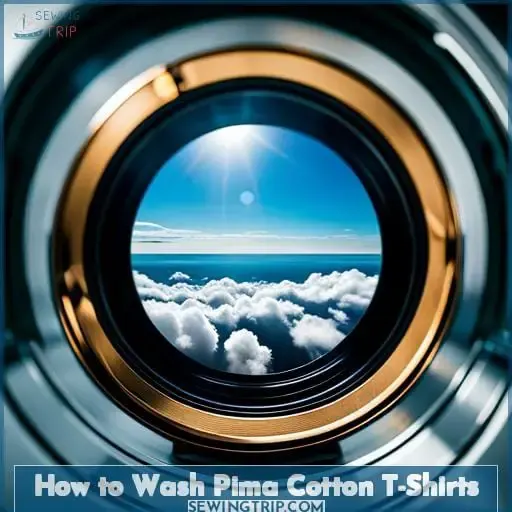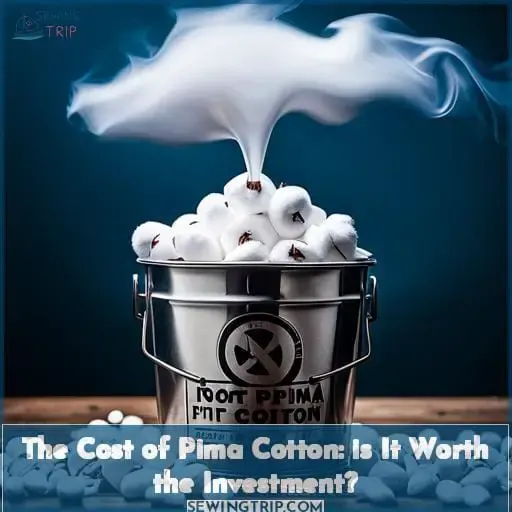This site is supported by our readers. We may earn a commission, at no cost to you, if you purchase through links.
Pima cotton is a popular fabric choice for clothing and home textiles due to its lightweight, breathable, and hypoallergenic properties. However, when it comes to laundering Pima cotton items properly, many people are left with unanswered questions.
To illustrate the importance of this question, consider an anecdote from a woman who bought her husband new pajamas, only for them to shrink after washing. Knowing how best to care for your Pima cotton garments and textiles will help ensure that you get the most out of these products over time without ruining them in the process.
In this article, we will discuss what causes Pima cotton fabrics to shrink and how you can prevent it from happening. We will also answer some commonly asked questions about caring for your clothes made from this fabric type.
Table Of Contents
- Key Takeaways
- The Shrinkage Factor of Pima Cotton
- How to Prevent Pima Cotton From Shrinking
- Pima Cotton Vs. Supima Cotton: Which Shrinks More?
- How to Wash Pima Cotton Sheets
- How to Wash Pima Cotton T-Shirts
- Can You Bleach Pima Cotton? Pros and Cons
- Does Pima Cotton Stretch? What to Expect
- Can You Unshrink Pima Cotton? Tips and Tricks
- How to Soften Pima Cotton Sheets
- The Cost of Pima Cotton: is It Worth the Investment?
- Frequently Asked Questions (FAQs)
- Conclusion
Key Takeaways

- Proper laundering is crucial to prevent Pima cotton from shrinking and maintain its size and shape.
- Supima cotton shrinks more than Pima cotton, so extra care is needed when washing Supima cotton items.
- Air-drying Pima cotton is recommended whenever possible, or using low heat when machine drying.
- Chemical coatings such as fabric softeners should be avoided when softening Pima cotton.
The Shrinkage Factor of Pima Cotton
You need to pay extra attention when laundering Pima cotton as its shrinkage factor can affect the size and shape of this lightweight fabric. Always check for a care label on the item before washing, which will provide instructions on how best to handle the material.
If there is no care label available, use cool or lukewarm water with mild detergent to avoid shrinking and fading of color.
When using a washing machine, select the gentle cycle at 30°C and the inside-out wash setting if possible. Never use hot water as it may cause excessive shrinking – up to 5% in some cases – so stick with warm or cold temperatures instead! Additionally, separate colored clothes from white ones before putting them into the washer and refrain from adding any fabric softener, which could alter their original size over time if not done correctly.
Finally, air-dry items whenever possible or use low heat when machine drying. Never leave damp clothing hanging around too long either; hang dry right away! In sum, taking proper precautions such as caring for your Pima cotton properly will ensure that your garments remain looking great while keeping their original size intact after every wash cycle.
How to Prevent Pima Cotton From Shrinking
Properly caring for your Pima cotton clothing is important to prevent it from shrinking. To keep this delicate fabric looking its best, follow a few simple rules. Firstly, be sure to read the label on your garment for washing instructions and use a gentle cycle with cold water.
Secondly, avoid over-drying in the dryer; instead, air dry or tumble on low heat if instructed. Lastly, ironing should also be done with care by using the steam setting at medium temperature and avoiding harsh bleaching products as they can damage the fibers of the fabric.
Washing Instructions
When laundering, it’s important to pay attention to the instructions on your garment so that you can keep its size and shape intact. Pima cotton should be washed in cool water using a gentle cycle or hand wash with natural solutions.
It’s recommended to pre-wash new fabrics and avoid fabric softener as this will reduce absorbency of the material. Temperature control is key when drying. Air drying or low heat machine dry are preferred methods over high heat tumble dryers which may shrink the fabric further.
If desired, use vinegar to soften sheets but avoid chemical cleansers as they may damage delicate fibers of Pima cotton garments beyond repair.
Drying Instructions
To keep your Pima cotton garments looking like new, it is best to air dry or use low heat when machine drying. High heat tumble drying can shrink the fabric. It is recommended to wash in cool water to prevent fading and shrinking, and to avoid using fabric softener.
Hang drying is also helpful in preventing the garment from stretching out of shape. For best results, hang dry on a flat surface. If you need to iron your Pima cotton garment, do so at a warm temperature while it is still wet.
Use steam sparingly to avoid flattening the fibers too much during the process. If you want extra protection against damage when cleaning Pima cotton items, hand washing is still preferred.
Ironing Instructions
Iron your Pima cotton garment with a light touch, as if you’re walking on eggshells. To avoid shrinking and maintain the original shape of your clothing, use warm water wash temperatures at or below 30°C when laundering.
Ironing should be done while the fabric is still wet for optimal wrinkle removal. Set the iron to a warm setting and add steam as needed. Additionally, refrain from using fabric softeners, which can cause damage to the fiber’s natural characteristics.
Follow these tips for safe ironing of delicate Pima cotton garments that will last longer and look better without risking potential shrinkage:
- Avoid hot water washes
- Do not use bleach or harsh chemicals
- No fabric softeners
Bleaching Instructions
Avoid using bleach and harsh chemicals when laundering delicate Pima cotton garments to prevent shrinking, fading, or damage. Instead, consider using fabric softener to achieve a softer feel without compromising the integrity of the garments.
When using chemical cleansers on Pima materials, such as Supima cotton, be mindful of the wash cycle and drying settings you choose. Natural solutions, like vinegar, can also be used to clean fabrics without risking damage due to chemical exposure.
It’s important to note that chlorine bleach should never come into contact with delicate Pima cottons. With proper care and mindful washing practices, your clothes can last for years while maintaining their original size and color.
Pima Cotton Vs. Supima Cotton: Which Shrinks More?
You’ll want to be extra careful when choosing between Pima and Supima cotton, as one shrinks more than the other! When washing temperatures are too hot or fabric softeners are used on Pima cotton items, they will shrink.
However, using cooler wash cycles and avoiding harsh chemicals like bleach alternatives will help keep it from shrinking. Ironing temperature should also be kept low when dealing with this type of fabric in order to avoid further damage.
Fortunately for those who choose Pima cotton bedding or new Pima cotton tees, there is some good news – after the first wash, following a few simple steps makes any further shrinkage minimal at best.
For instance, drying excess water off by hand before machine-drying can prevent most future shrinking issues.
How to Wash Pima Cotton Sheets
To keep your sheets soft and wrinkle-free, wash them with gentle care using cool water. Pima cotton is a type of regular cotton made from natural fibers that are lightweight, breathable, and hypoallergenic.
The best method for washing pima cotton sheets is by hand in cold or lukewarm water. But, you may also machine wash on a gentle cycle at 30°C inside out to prevent fading or color bleeding. Avoid fabric softeners as they can decrease the absorbency of the material. Instead, opt for a mild laundry detergent specifically formulated for delicate fabrics such as those made from natural fibers.
To dry pima cotton sheets, either air dry flat on towel racks or tumble dry on low heat (if allowed). If ironing, be sure to do so while wet with warm settings and use steam if necessary. Hang drying is recommended since this will avoid any risk of stretching or shrinking due to high temperatures created during the tumble drying process.
To get rid of germs without risking damage, try some natural solutions such as vinegar rather than harsh chemical cleansers, which could ruin your investment over time! Overall, caring properly means less money spent on replacing these items regularly.
How to Wash Pima Cotton T-Shirts
When laundering your Pima cotton t-shirts, always check the care instructions to ensure proper washing. For optimal results, it’s best to start by soaking the shirt in cool water for at least 30 minutes before machine washing.
This will help remove any dirt or stains that may have accumulated and prevent them from setting into the fabric during a hot wash cycle.
Avoid using fabric softener as this can make Pima cotton more prone to shrinking and fading over time. When machine washing, use warm temperatures with low heat on a gentle cycle rather than hot water – this will save you money on your electric bill too! Different care labels may require different cleaning methods, so be sure not to follow one label’s instructions blindly for all of your items.
Some shirts might need dry cleaning instead of being washed in a regular washer/dryer combo with detergent and cold or warm water cycles.
After the spin cycle is complete, hang drying is recommended since tumble drying could cause shrinkage if done at high temperatures. Lower settings are advisable but still won’t guarantee no shrinking takes place over multiple uses! Additionally, ironing while wet at warmer settings (but not boiling!) may help keep Pima cotton looking its best without risking damage due to excessive heat exposure when dry ironing.
Following these tips should allow you to get many wears out of each item without having to worry about ruining them through improper laundry techniques!
Can You Bleach Pima Cotton? Pros and Cons
Bleaching Pima cotton has both advantages and disadvantages, so it’s important to consider the pros and cons before deciding if this is right for you. If done correctly, bleaching can brighten up colors that may have faded over time or make whites look brighter.
However, there are risks such as fabric damage or color fading that should be considered when using any form of chlorine bleach on your Pima cotton tees. Before using regular chlorine bleach on your clothing items made from Pima cotton, always read the care instructions first.
Vinegar usage is a great alternative method to whiten clothes without damaging them compared to regular bleaches which contain harsh chemicals.
When considering whether or not you should use a bleach product on Pima cotton products such as t-shirts, keep in mind that they are usually more expensive than other fabrics due to their softness and quality.
Therefore, taking good care of those purchases might result in savings in the long run by avoiding damages caused by improper treatments.
Does Pima Cotton Stretch? What to Expect
You might be surprised to find out that Pima cotton can stretch over time, though the extent is unknown. It’s a lightweight and durable fabric made from natural fibers, so it has some characteristics of other fabrics in its family.
As with any fabric material, measuring shrinkage rates before washing is essential for anyone wanting to purchase or use Pima cotton. Washing tips should also be followed closely as not all water temperatures are suitable for this type of material.
Warm or cool water is usually best when laundering Pima cotton items like sheets and t-shirts in order to avoid shrinking and stretching during the cycle.
When comparing quality between Supima Cotton (its sister fiber) versus Pima Cotton, you may notice that the former resists shrinking more than the latter, but both materials will still experience some level of shrinkage up to 5%.
Anti-shrink chemicals may help reduce these issues if used according to care instructions on labels, but it’s important to understand their usage limitations before using them on your garments too frequently as they could damage delicate fibers such as those found in Pima cotton.
Additionally, dry cleaning isn’t always necessary either. Natural solutions such as air drying can often offer better results without compromising safety standards, which make them ideal options for germ-free clothing preparation while minimizing risk associated with harsh chemicals being released into our environment unnecessarily.
Overall, one must consider all factors when selecting high-end materials like 100% grade Pima cotton. Due to cost savings received in the long run, it makes selection easier. Although proper care needs to be taken to ensure the longevity of the product life expectancy desired by many consumers who value quality products over cheaper alternatives available in the market today.
Can You Unshrink Pima Cotton? Tips and Tricks
Do you have questions about how Pima cotton behaves when washed? Does it shrink or stretch? Does Supima cotton, a type of Pima cotton, shrink when washed too? In this discussion, we will analyze whether Pima cotton has any stretch and if Supima cotton shrinks in the wash.
By looking at different washing techniques and care instructions for each fabric type, we can answer these important questions about your clothing items made from either one or both fabrics.
Does Pima Cotton Have Stretch?
Be aware that this fabric may stretch over time, though the exact amount is unknown.
- Wash coloreds and whites separately using cool water cycles – warm water washes can cause bleaching safety risks;
- Don’t use fabric softener as this could decrease its lifespan;
- Hang dry items rather than machine drying them at high temperatures;
- Iron while still damp on a low setting with steam if needed.
Although Pima Cotton might be expensive compared to other fabrics, taking proper care of it will result in savings down the road. It should last longer due to being cared for correctly so you don’t have to replace clothing or sheets right away when they begin showing signs of wear or get too small from shrinking after washing incorrectly.
Keeping these tips in mind will help you find the right size item that gets just enough good amount of stretch but doesn’t shrink during the wash cycle.
Does Supima Cotton Shrink When Washed?
When laundering Supima cotton, it’s important to keep in mind that while it is stronger than Pima cotton, the fabric can still shrink up to 5% with a cool or warm water wash. To ensure maximum longevity of this top-quality cotton product and prevent shrinkage as much as possible, take extra care when washing and ironing.
Use mild detergents on low temperatures recommended for the fabric type, and avoid bleaching or using harsh chemicals. Don’t use any fabric softeners, and opt for hang drying instead of machine drying.
Ironing tips include setting your iron at medium heat if necessary, but be sure not to overdo it as too much heat could cause damage.
Frequent washing should also be avoided since frequent wear will help reduce the risk of shrinking due to regular friction from movement against fabrics such as denim jeans or other rough surfaces like leather jackets – resulting in a lower shrink rate overall! Taking these simple steps can ensure that you get all the benefits out of your Supima purchase without worrying about permanent damages caused by careless laundering habits.
How to Soften Pima Cotton Sheets
To keep your Pima cotton sheets extra soft, try using a natural solution like vinegar for laundering. Vinegar is an effective way to soften the fabric without resorting to chemical cleansers or other harsh solutions that could damage it.
It can be used when preparing Pima cotton for sewing projects as well as regularly cleaning the sheets themselves.
Dry cleaning may also work, but it should only be done if absolutely necessary. Air-drying or simply drying outside will help maintain the sheets’ original shape. When washing with any kind of detergent, avoid fabric softener, which can ruin the delicate fibers in Pima cotton.
Instead, opt for a mild detergent specifically designed for this type of material. Washing in cool water prevents fading and shrinking, so always separate colored items from whites when possible.
Cleaning by hand is still the best option if you want to ensure your sheets keep their original shape even after the first wash. If you’re looking into alternatives such as natural solutions, diluting vinegar with water before use tends to give better results than using it on its own.
Either pour some directly onto a clean surface or add half a cup per gallon of warm water during the rinse cycle (cold works too). This will eliminate bacteria while keeping the fabric nice and soft without risking damage to the fibers over time.
The Cost of Pima Cotton: is It Worth the Investment?
You’ll be amazed at the luxurious feel of Pima cotton on your skin, and how it can withstand repeated washings but stay looking new – making this investment a real bargain. Quality fabric like 100% Pima cotton will last for many years if cared for properly.
Caring for Pima Cotton requires cool or warm water washing without using chemical cleansers, and when done correctly, garments can look good over long periods of time without losing ground to fading or shrinking.
Softening Pima cotton also requires special attention as chemical coatings such as fabric softeners should be avoided in order to preserve its unique texture and breathability. Natural solutions are best here; vinegar is an excellent option that won’t damage the material while still providing much-needed softness to sheets made from it.
Sewing with Pima cotton is also possible by pre-washing any material before utilizing them in projects, ensuring you don’t lose money due to shrinkage down the line! Unshrinking Pima usually isn’t necessary as proper care will prevent constant shrinking in most cases – however, if something does go wrong, just remember not to use high heat drying which could destroy your garment’s good looks forever!
In short, investing in quality pieces made from 100% Pima Cotton may cost more upfront but provides value over time thanks to its superior durability compared to other fabrics available on the market today – all combined with a luxurious feel that simply cannot be found elsewhere makes this one purchase you won’t regret making anytime soon!
Frequently Asked Questions (FAQs)
Is Pima cotton eco-friendly?
Yes, Pima cotton is eco-friendly and sustainable. It is lightweight, durable, breathable, and hypoallergenic, making it an excellent choice for those who want to reduce their environmental impact without compromising quality.
Additionally, its biodegradability ensures that it will not linger in landfills for years.
Does Pima cotton wrinkle easily?
No, Pima cotton is virtually wrinkle-free. Its lightweight and durable structure make it an ideal fabric for everyday wear. Its hypoallergenic qualities mean you can trust it to stay looking sharp all day long.
How do you iron Pima cotton?
Iron Pima cotton on a warm setting while the fabric is still damp. Use steam if necessary to prevent it from appearing flat and dull.
What are the best cleaning solutions for Pima cotton?
To properly clean Pima cotton, it is recommended to hand wash it in cool water and separate whites from colors. It is also advisable to air-dry or use low heat machine drying to prevent any shrinking or stretching.
For germ-free laundering without any risk of damage, natural solutions like vinegar may be a better option.
How does Pima cotton compare to other fabrics?
Pima cotton is a lightweight yet durable fabric renowned for its breathability and hypoallergenic qualities. Compared to other fabrics, it may shrink when laundered incorrectly but can hold its shape if washed properly.
Additionally, it is biodegradable, providing an environmentally friendly option that may cost more initially but pays off in the long run.
Conclusion
Pima cotton is an excellent choice for those looking for a durable and breathable fabric. It is lightweight, hypoallergenic, and biodegradable, making it ideal for those with sensitive skin. Additionally, it offers great value for money, with little shrinkage when washed correctly.
However, if you are looking to save money in the long run, does pima cotton offer enough of a return on investment to make it worth the cost? It is up to you to decide if the benefits outweigh the price.

